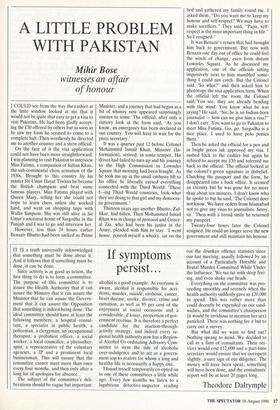If symptoms
persist...
IT IS a truth universally acknowledged that something must be done about it. And it follows that if something must be done, it can be done.
Since activity is as good as action, the first thing to do is to form a committee. The purpose of this committee is to assure the Health Authority that it can assure the Ministry that it can assure the Minister that he can assure the Govern- ment that it can assure the Opposition that something is indeed being done. The ideal committee should have at least the following members: a hospital consul- tant, a specialist in public health, a policeman, a clergyman, an occupational therapist, a probation officer, a social worker, a local councillor, a physiother- apist, a representative of the voluntary agencies, a JP and a prominent local businessman. This will ensure that the committee cannot meet more than once every four months, and then only after a long list of apologies for absence. • The subject of the committee's deli- berations should be vague but important: alcohol is a good example. As everyone is aware, alcohol is responsible for acci- dents, murder, suicide, cirrhosis, cancer, heart disease, stroke, divorce, crime and ruination, as well as 95 per cent of the enjoyment at social occasions and a considerable, if lesser, proportion of gov- ernment revenue. It is therefore a perfect candidate for the inaction-through- activity strategy, and indeed every re- gional health authority now has a Region- al Alcohol Co-ordinating Advisory Com- mittee to stem the tide of alcoholic over-indulgence and to act as a govern- ment sop to zealots for whom a long and healthy life is necessarily a happy one.
I found myself temporarily co-opted on to one of these committees a little while ago. Every few months we listen to a lugubrious detective-inspector reading out the drunken offence statistics since our last meeting, usually followed by an account of a Particularly Horrible and Brutal Murder Committed While Under the Influence. We tut-tut with deep feel- ing, and even shake our heads. Everything on the committee was pro- ceeding smoothly and serenely when the health authority suddenly gave us £20,000 to spend. This was rather more than could decently be expended on our sand- wiches, and the committee's chairperson (it would be invidious to mention her sex) panicked. There was nothing for it but to carry out a survey.
But what did we want to find out? Nothing sprang to mind. We decided to call in a firm of consultants. Their ser- vices would cost £12,000 and a part-time secretary would ensure that we overspent slightly, a sure sign of our diligence. The money will have been spent, something will have been done, and the consultants' report will be at least 20 pages long.
Theodore Dalrymple


























































 Previous page
Previous page